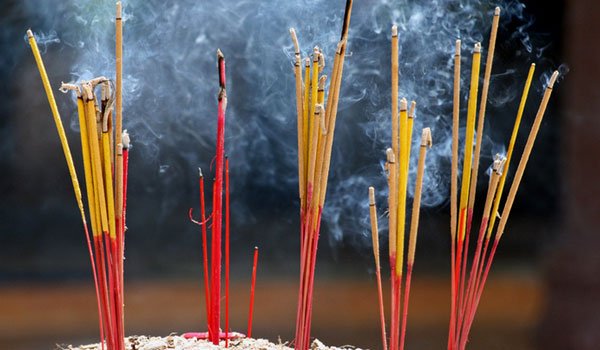But the smoke coming from those fragrant sticks may be more toxic to the body's cells than cigarette smoke, new research warns.
A study found that can incense-smoke is more mutagenic, genotoxic and cytotoxic than cigarette smoke.
That means it is able to cause genetic mutations and cause changes in cells' DNA, all of which can lead to cancer.
The researchers hope the study will lead to an evaluation of incense products.
However they cautioned the study was small in size and conducted only in rodents - and so firm conclusions about the health effects cannot be drawn from it.
And commenting on the study, Dr Nick Hopkinson, medical adviser to the British Lung Foundation, said it reiterated that many forms of smoke, including that from incense, can be toxic.
Given the study's findings, it might be wise for people with lung disease to avoid burning incense, as well as parents with children whose lungs are developing, he said.
When incense, which is usually made of bamboo sticks coated in sawdust and essential oils, is burned, particles are released into the air.
If these are breathed in they can become trapped in the lungs, and are known to cause an inflammatory reaction.
Until now, not much research has been done on incense as a source of air pollution, although it has been linked to the development of lung cancer, childhood leukaemia and brain tumours.
The researchers wanted to assess the health hazards associated with using incense smoke in the home.
Led by Dr Rong Zhou, of the South China University of Technology, they decided to test the effect of incense smoke on cells and compare it to the effects of cigarette smoke.
They tested two types of incense. Both contained agarwood and sandalwood, which are among the most common ingredients used to make this product.
They then compared the effects of incense-smoke and cigarette smoke on ovary cells from Chinese hamsters and tester strains of Salmonella.
Incense smoke was found to be more mutagenic, cytotoxic and genotoxic than the cigarette smoke tested in the study.
This means it contains chemical properties that can change genetic material, such as DNA in cells, and therefore cause mutations..
Moreover, mutagenics, genotoxins and cytotoxins have all been linked to the development of cancers.
Smoke from the incense sticks used in the study was made up of ultrafine and fine particles, and as they are breathed in easily, is therefore likely to have adverse health effects, researchers said.
Taken together, smoke from the four incense sticks analysed contained 64 compounds.
While some of these are irritants or are only slightly harmful, ingredients in two of the sticks tested are known to be highly toxic.
Dr Zhou said: 'Clearly, there needs to be greater awareness and management of the health risks associated with burning incense in indoor environments.'
He added that he hopes the results will lead to an evaluation of incense products and help to introduce measures to reduce people's exposure to the smoke.
However, he warns one should not simply conclude that incense smoke is more toxic than cigarette smoke.
The small sample size, the huge variety of incense sticks on the market and differences in how it is used compared to cigarettes must be taken into account, he said.
The research, which was also carried out by the China Tobacco Guangdong Industrial Company, was published in the journal Environmental Chemistry Letters.
-Daily mail






